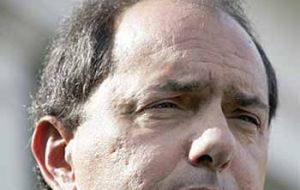MercoPress. South Atlantic News Agency
Argentine dissident Peronists want control of the party
 Count down for Governor Scioli’s days as president of the party?
Count down for Governor Scioli’s days as president of the party? Dissident members of the Argentine ruling Justicialista (Peronist) Party have asked for the removal of the party’s interim president and the naming of new authorities, following the debacle of last Sunday’s mid term election for President Cristina Fernandez de Kirchner and husband Nestor Kirchner.
The Kirchner couple presented the Sunday ballot as a referendum on their six years of government (four plus two) but suffered a resounding defeat particularly in the province of Buenos Aires, which given its vote significance (36% of the national electorate) is not only the stronghold and backbone of the Justicialista party dominance but also the winning card for any Argentine election.
Mr. Kirchner quit as president of the party on Sunday and left in his place Buenos Aires province governor Daniel Scioli, but since he belongs to the same slate of candidates as the former president, he is under strong pressure to resign and renew authorities since most dissident governors refuse to talk with him.
“There are several governors who have more authority and representation to put the house in order. Politics is always moulded by winners and not by losers” said Francisco de Narvaez who was elected first Buenos Aires province deputy in the slate that defeated that headed by Mr. Kirchner.
Mr. De Narváez success in the province is attributed to an intelligent alliance between dissidents from the ruling Justicialista party and the conservative mayor of the City of Buenos Aires, Mauricio Macri, a strong presidential hopeful for 2011.
“Scioli’s time is possibly a very short transition period since he doesn’t represent all the different feelings inside the party”, said Deputy Jorge Busti.
“We must hold elections in the party but with a clean registry of affiliates”, added Busti who repeated claims from governors who refuse to talk with Scioli since he represents the “losers”.
“Let’s put an end to soap operas”, said Scioli who nevertheless admitted that “as I hold meetings with the different leaders we’ll work out the next steps” and decide if in the short term a new leadership is nominated or elected.
Scioli insists that the party “belongs to no one, it belongs to all, it’s a national and federal organization” and pointed out that “we must recover the pluralism that has been characteristic of Justicialismo”.
“We have to listen to all parties, to all sides and following on that, we can begin solving the internal problems”, underlined Scioli, who side tracked when he was asked if he was thinking of resigning to the post.
However even governors and leaders who were supportive of Mr. Kirchner have begun to take distance from the administration of his wife President Cristina Fernandez de Kirchner.
In her first speech following Sunday’s defeat Mrs. Kirchner admitted they had lost control of Congress but nevertheless said she counted on support from legislators and governors to ensure governance.
Farm leaders who for over a year have been struggling with the Kirchner administration over export taxes on cereals and oilseeds, also demanded a change of attitude from the government and the Justicialista party.
“On Sunday there was a clear message from 70% of the electorate: those who reach out for consensus, dialogue and understanding are the winners”, said Eduardo Buzzi.
Farmers played a crucial role in the downfall of the Kirchners when they openly protested excessive windfall taxes and the Senate with the decisive vote of the Vice-president rejected the proposal.
“The Kirchners turned a mid term election into a referendum and they lost, people told them to be less arrogant and to begin listening. On the one side you have Vice president Julio Cobos, who was openly successful in his province and the Kirchners defeated. They must assume defeat”, added Buzzi.
“The message was clear, government must be humble, ear to the ground and listen what’s coming”, said the farm leader who anticipated “farmers will begin rallying again to contact congressional leaders and help the camp begin producing again”.
Since March last year farmers and the Kirchners have been confronted over windfall taxes. Farmers organized huge rallies, stopped for days on several occasions the supply of food to cities, with the exception of perishables and in July 2008 convinced the Senate to overturn the tax bill.
The Kirchners since then lost initiative and have been desperately trying to gain the upper hand but their confrontational government style plus world recession and now the flu seem to have buried the initial aura of several years of sustained growth.




Top Comments
Disclaimer & comment rules-

Read all commentsvamos carajo aguante peron viva la patria vamos lo pibes volveremos a malvinas carajo
Jul 05th, 2009 - 01:55 am 0Commenting for this story is now closed.
If you have a Facebook account, become a fan and comment on our Facebook Page!